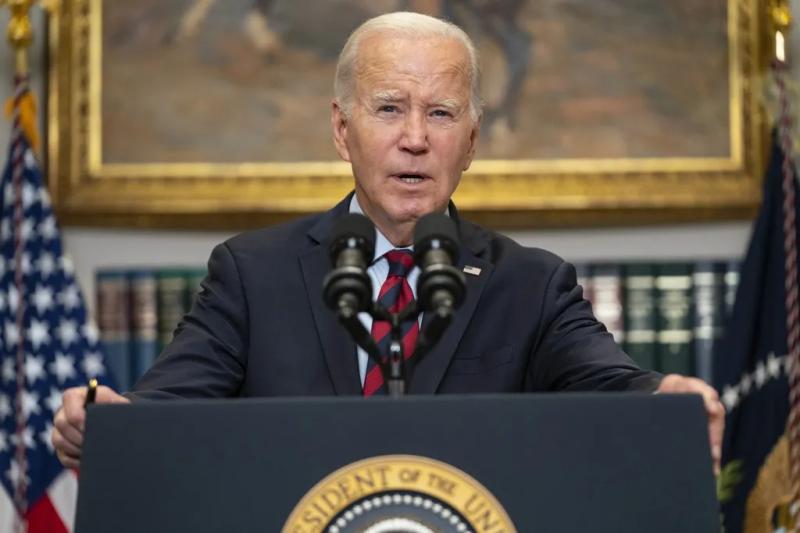Biden not fooling voters on economy



If you want to explain to a puzzled left-leaning writer like the Atlantic's Annie Lowrey why most voters this year rate the economy during Donald Trump's presidency more favorably than that during President Joe Biden's, you might start with a pair of simple charts.
Lowrey said the Biden years have seen "the strongest economy the United States has ever experienced." She cited an unemployment rate below 4%, wage growth higher "than at any point during the Obama presidency," and "stronger pay increases" than any in the last 50 years. Inflation, she noted defensively, "has cooled off considerably."
All well and good, and you can hear similar thoughts from Democratic economists and Biden administration spokesmen. Together, sometimes, with suggestions that many voters are, well, just not knowledgeable or sophisticated enough to appreciate the bounty the administration's policies have produced.
In response, look at the pair of charts tweeted by Republican consultant Patrick Ruffini as evidence of "how Joe Biden is losing the election with an economy like this." They come from an article in last weekend's Wall Street Journal by Greg Ip and Rosie Ettenheim.
After comparing rises in the Dow Jones average during the two presidencies, the writers focused on "a better measure of financial wealth, net worth, including not only financial assets but real property, minus debts." Nominal growth in the first three years of both administrations was robust — 23% during Trump's and 19% during Biden's.
That's reflected in the first of the pair of charts. The second takes inflation into account and shows the changes in household net worth. The first year of each administration saw modest increases, under 10%, but 15 months in, the lines diverge.
Real household net worth kept climbing during the Trump presidency, with some downward spikes roughly coinciding with the November 2018 off-year elections and the imposition of COVID restrictions. Altogether, inflation-adjustment household net worth grew a robust 16% during the Trump presidency.
In contrast, the line showing real household net worth during the Biden presidency shoots downward in the summer of 2022, following and perhaps sustaining the plunge of Biden's job approval after the botched withdrawal from Afghanistan.
For the last two years, real household net worth has mostly continued in negative territory, finally poking just barely above the January 2021 level. For the total Biden presidency so far, Ip and Ettenheim reported, it is up a barely perceptible 0.7%.
Given these numbers, it should not be entirely mysterious why many people, including most partisan Republicans but many Democrats as well, don't believe they are witnessing "the strongest economy the United States has ever experienced."
It's true that most political commentary and the economic exhortation one can find in the New York Times opinion pages don't highlight changes in household net worth. But it may be a better index to voters' economic discontent (or contentment) than the oft-used unemployment or total income figures.
When I was growing up in Detroit in the 1950s, people lived in terror of unemployment. They had vivid memories of the Great Depression, in which stretches of unemployment could last for years, maybe permanently, and the absence of a regular paycheck meant meatless meals and raising vegetables in backyard gardens. You couldn't get through by using your credit card for groceries or school clothes (Visa was introduced in 1958 and was uncommon for the next decade).
Inflation operates differently today as well. Voters under 60 have had no significant experience with inflation in the U.S. When prices suddenly jump up by magnitudes entirely outside your experience (gasoline is up 48%, electricity is up 28%, pet food is up 24%, and restaurant meals are up 21%), and when they show no sign of falling back to familiar levels, you may be inclined to blame a national administration, particularly one that boasted of injecting vast sums into an economy that had high savings rates during the pandemic. And you may not take comfort from assurances that inflation "has cooled off considerably."
These days, most people are embarked on a path to accumulate modest but significant wealth. They can withstand, with some pain, a bout of unemployment and low wage increases as in 2007-17. But a spell of persistent inflation leaves them feeling they're falling behind. No wonder "Bidenomics" is a hard sell.
Meanwhile, Democrats' argument that Trump poses a threat to democracy "is not working," as Ezra Klein, Lowrey's husband, wrote in the New York Times. Most of the Biden-encouraged prosecutions of Trump have been postponed, perhaps indefinitely, and the kangaroo court proceeding in Manhattan is discrediting not the defendant but his persecutors. On this, as on the economy, Biden strategists are better at fooling themselves than fooling the voters.






Constantly Lying about it (inflation was 9% I was sworn In) while simultaneously downplaying it (people have money to spend!) just reinforces his problems
Tell Marie & Joe that Americans are going to return to eating STEAK. The nice juicy ones like you get at The Big Texan in Amarillo.
The "economy" is too big for most people to understand, so they tend to look at only pieces of it. This is why kitchen table issues are so more important when it comes to a presidential election.
On one hand, the stock market is up at new highs. According to a recent report from Fidelity, retirement accounts are at their highest levels since the 4th quarter 2021. Fidelity also reported that the number of 401k millionaires has hit a new high. Home prices are up so if you own your home the equity in it has increased your net worth.
On the other side, inflation is still stubbornly high, taking costs up with it. Food and gas which are both normal consumables for the American public continues it's increase in costs, cutting into the paycheck more each week. Those on a fixed budget are not really keeping pace with the increases, but losing ground steadily. It's also reported that the savings that had built up over the pandemic has largely been depleted and people have been racking up more and more debt. This shows signs of slowing now as last month's consumer spending report was weaker than expected which should slow down retailers price increases.
But the rising levels of consumer debt and delinquency rates is high and rising which should raise the concern of the administration. As delinquency rates increase, banks will raise interest rates and slow the advance of credit to borrowers deemed riskier. These combined effects can contribute to a broader economic slowdown or even recession.
I said it before, and I think it bears repeating. Whoever wins in November is going to inherit a nasty economic issue.
But lord knows they’ve been trying.
Useful idiots, gaslighting full time.
"Useful idiots, gaslighting full time."
I think it is ingrained in some into their DNA. They cannot help themselves./s
Yep, it reached a fever pitch after 2016 and never let off. I expect some will begin to have real physical problems when Trump wins in November. The psychological issues are well documented elsewhere and here ….
Yep.
I fully expect some hard core lefty lib heads will most likely be imploding (metaphorically speaking anyway) should Trump win. But when it comes to DC politics and presidential elections, nothing is written in stone.
Meh, my head won't explode, but my guess is by the time his term is over, (should he win), right wing heads will be exploding when they see all the damage he caused.
Biden’s Numbers, January 2024 Update
Summary
Para leer en español, vea esta traducción de Google Translate.
Here’s how the United States has fared since President Joe Biden took office three years ago:
In which demographic? How much were these people making per year?
Oops.
Americans
You should probably understand the difference between net worth and income.
That's all you got? Wow. Perhaps read what I posted. Your answers are right there in front of you.
you are the one who asked questions without apparently understanding the subject. Not me.
Why would you ask "how much these people were making a year" when the subject is net worth? Do you not understand the difference between the two things?
Again, do you understand the difference between personal wealth and income?
Why did Obama make them permanent? Would a President Biden do the same with the Trump tax cut in 2025?
He didn't. Same way Biden didn't make Trump's tax cuts for the rich permeant. Duh.
In 2012, Obama signed the American Taxpayer Relief Act of 2012 and made permanent most of the Bush II income tax cuts.